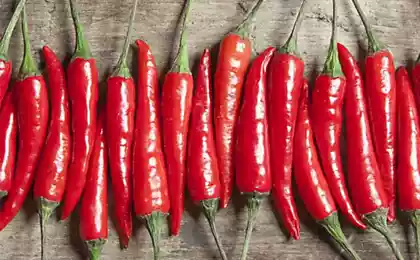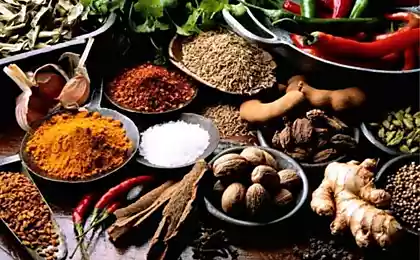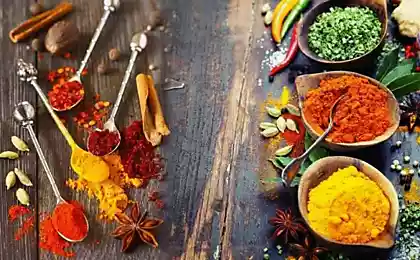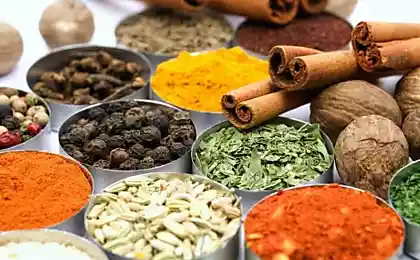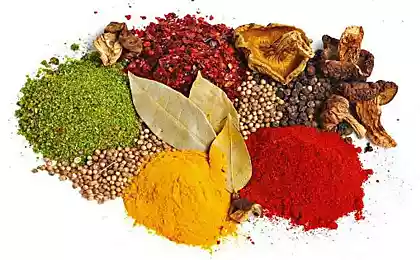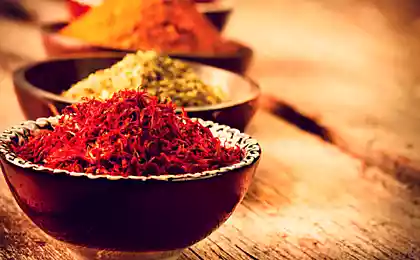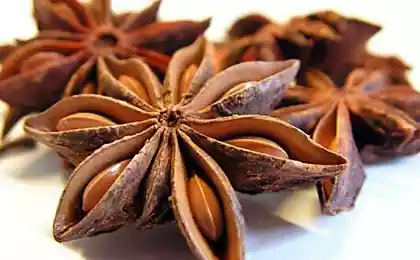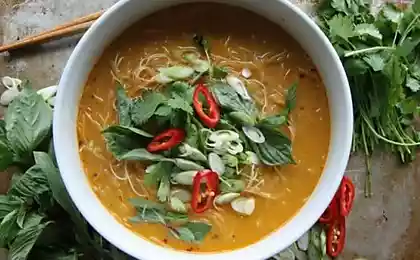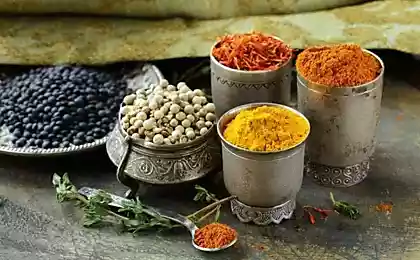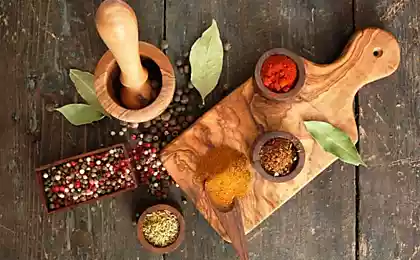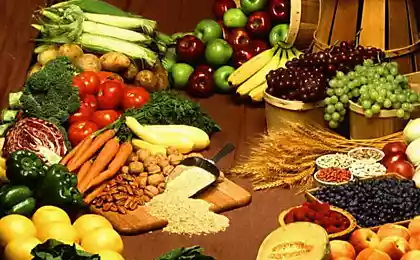451
4 spices that cause a devastating anti-inflammatory impact
Culinary herbs and spices contain a wide range of antioxidants, minerals and vitamins and help to obtain from food maximum benefit. Every time by adding seasoning or spices to a dish, you are literally "improve" it, not in the least increasing its calorie content.
Indeed, in one gram of the spice more antioxidants than fruits and vegetables, which are known to be rich in these substances. Many studies have also shown that most spices tend to have unique healing properties.
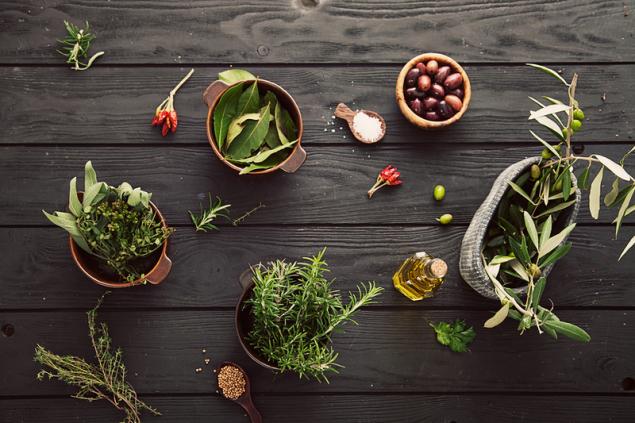
In one of them, the researchers from three universities devised an experiment to estimate the useful properties of herbs and spices in "normal life" — people used them in the quantities that are typically used to impart a spicy taste to the dishes. As noted by Dr. Michael Greger:
"The researchers could go the easy route and just measured the change in the level of antioxidants in the blood before and after consumption, but the assumption that the appearance of antioxidant activity in the blood is a sign of bioavailability, is not without its weaknesses.Perhaps the body absorbs more than we think, but it does not show the results of tests for antioxidants, because the latter bind to proteins or cells. Therefore, the researchers attempted to measure physiological changes in the blood.They were interested in whether absorbed compounds to protect white blood cells from an oxidative or inflammatory damage — in other words if the herbs and spices protect DNA strands from breakdown caused by free radicals".
Four anti-inflammatory spices are a devastating blow
During the week of 10-12 subjects each of 13 groups consumed daily a small amount of specific spices. In the group of oregano daily, for seven days, eat only half a teaspoon of oregano. For an hour before use and at the end of the experiment, participants took the blood samples.
The blood is then examined on the subject of antioxidant capacity. In addition, the researchers analyzed how effectively weakens the blood caused by the inflammatory response in white blood cells.
For this the blood of the participants were placed on white blood cells damaged by oxidized cholesterol (which, as a rule, contained in fried foods). It is established that even in the "casual" number of four herbs essentially suppress the inflammatory response:
Carnation
Ginger
Rosemary
Turmeric
As noted in the article: "These results show what can happen when cells in the body affected by the spices in the amount circulating in the bloodstream after normal daily consumption, not is mega-tablets. Just one pinch, which improves the taste of spaghetti sauce, pumpkin pie or curry sauce".
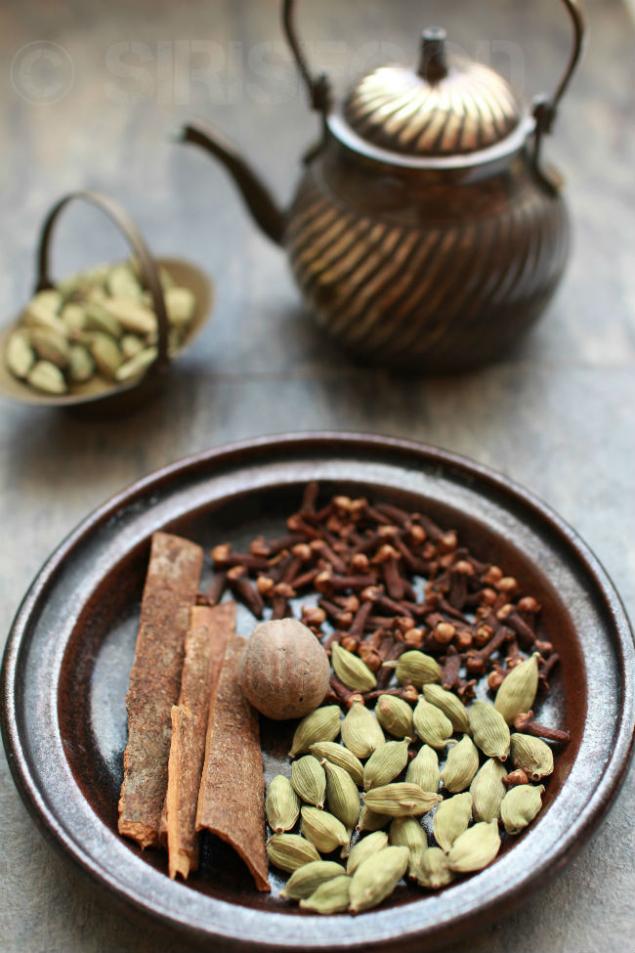
Other spices with strong anti-inflammatory effectearlier research published in the "journal of medicinal food" found a direct correlation between the antioxidant content of phenol in extracts of herbs and spices and their ability to inhibit glycation and block the formation of end products of enhanced glycosylation, so that they are an effective means fo heart disease and premature aging.
So, clove was the most effective of 24 herbs and spices that are in every kitchen. The top ten herbs and spices with the most potent anti-inflammatory action include the following:
Carnation
Cinnamon
Jamaican allspice
Mixture of spices for Apple pie
Oregano
Mixture of spices for pumpkin pie
Marjoram
Sage
Thyme
Fine Italian spices
Inflammation is the root of most chronic diseasesit is Important to understand that chronic inflammation is the source of many, if not most diseases, including cancer, obesity and cardiovascular disease, which it is, in fact, is the leading cause of death in the United States.
Although inflammation is normal and beneficial process that occurs when white blood cells and chemicals the body protect you from foreign invaders such as bacteria and viruses, it still leads to trouble, if out of control. Not the last role in this chain of events plays in your diet.
Although, in a weight ratio of condiments and spices are most effective, they, of course, not the only available you anti-inflammatory ingredients. Its anti-inflammatory properties there are a number of products and if you will try to eat them as much as possible, this will help to prevent the occurrence of chronic diseases in the long term.
Seven best anti-inflammatory foodsthe Following foods and nutrients deserve special mention for their ability to suppress inflammatory reactions in the body:
1. Omega-3 fats of animal origin
Omega 3 animal fats from fatty fish such as wild-caught Alaskan sea salmon and fish oil or krill oil — help fight inflammation throughout the body. They are especially important for brain health. A study published in the "Scandinavian journal of gastroenterology" in 2012 confirmed that dietary supplementation with krill oil effectively reduces inflammation and oxidative stress.
2. Leafy greens
Dark leafy greens, e.g. Kale, spinach, Collard greens and Swiss chard contain powerful antioxidants, flavonoids, carotenoids and vitamin C — all help to protect cells from damage. Ideally, preference should be given to seasonal organic greens local produce and try to eat most of it raw. Squeezing juice is a great way to add more greens to your diet.
3. Blueberries
Blueberries are highly regarded for their antioxidant properties compared to other fruits and vegetables. In addition, it has less sugar than many other fruits and vegetables.
4. Tea
Matcha tea is the most nutrient rich green tea. It is sold in the form of ground-ground unfermented powder. Best matcha tea — Japanese. It has 17 times more antioxidants than wild blueberries, and seven times more than dark chocolate.
Tulsi is another tea rich in anti-inflammatory antioxidants and other micronutrients that support immune function and heart health.
5. The traditional way of fermented vegetables and cultured foods
Optimization of the intestinal flora is important for the smooth functioning of the immune system and helps prevent chronic inflammation. In fact, most inflammatory diseases starts in the gut, as a result of violations of the microflora balance. Fermented foods such as kefir, natto, kimchi, miso, tempeh, pickles, sauerkraut, olives and other fermented vegetables, will help to "re-colonize" the intestine with beneficial bacteria.
Additionally, fermented foods help to rid the body of harmful toxins, such as heavy metals and pesticides, that also contribute to inflammation.
6. Shiitake mushrooms
Shiitake mushrooms contain strong compounds with the natural ability to discourage inflammation, for example, rich in ergothioneine, which inhibits oxidative stress.
They also contain several unique nutrients that are lacking in the diet of many people. For example, copper is one of the few metallic elements accompanied by amino and fatty acids necessary for human health. Since copper in the body is not synthesized, it should be regularly supplied with the diet. Copper deficiency can be a factor in the development of coronary heart disease.
7. Garlic
Garlic is valued for centuries for its healing properties. In addition, he is one of the most actively studied plant sources of food. Its useful properties at more than 150 different diseases proven over 170 studies. Garlic is beneficial effect on a number of levels, thanks to its antibacterial, antiviral, antifungal, and antioxidant properties.
It is believed that a large part of the therapeutic effect of garlic is associated with sitosterolemia compounds, such as allicin. Studies have established that once in the body, allicin forms sultanovoy acid — a compound that reacts with dangerous free radicals faster than other known compounds.
Diet is the key to reducing chronic inflammationand a Broad range of common health problems — from obesity and diabetes to heart disease and cancer — have one common factor: chronic inflammation. Reduction of chronic inflammation starts with your diet, and freedom in the selection of high quality herbs and spices is an easy way to increase anti-inflammatory properties of food. This is an inexpensive "secret weapon" available to almost every one of us. However, if your diet mostly consists of processed foods, the simple addition of spices will help.
It is important to realize that dietary components can either prevent or trigger inflammation in the body, and processed foods it just cause, due to its ingredients, which contribute to inflammation: corn syrup, high fructose, soy, processed vegetable oils (TRANS fats) and other chemical additives. In addition to adding anti-inflammatory foods in your diet, it is also best to avoid the following culprits of inflammation in the body:
Author: Dr. Joseph Mercola
P. S. And remember, just changing your mind - together we change the world! ©
Source: russian.mercola.com/sites/articles/archive/2017/03/15/%D0%BF%D1%80%D0%BE%D1%82%D0%B8%D0%B2%D0%BE%D0%B2%D0%BE%D1%81%D0%BF%D0%B0%D0%BB%D0%B8%D1%82%D0%B5%D0%BB%D1%8C%D0%BD%D1%8B%D0%B5-%D0%BF%D1%80%D0%BE%D0%B4%D1%83%D0%BA%D1%82%D1%8B.aspx
Indeed, in one gram of the spice more antioxidants than fruits and vegetables, which are known to be rich in these substances. Many studies have also shown that most spices tend to have unique healing properties.

In one of them, the researchers from three universities devised an experiment to estimate the useful properties of herbs and spices in "normal life" — people used them in the quantities that are typically used to impart a spicy taste to the dishes. As noted by Dr. Michael Greger:
"The researchers could go the easy route and just measured the change in the level of antioxidants in the blood before and after consumption, but the assumption that the appearance of antioxidant activity in the blood is a sign of bioavailability, is not without its weaknesses.Perhaps the body absorbs more than we think, but it does not show the results of tests for antioxidants, because the latter bind to proteins or cells. Therefore, the researchers attempted to measure physiological changes in the blood.They were interested in whether absorbed compounds to protect white blood cells from an oxidative or inflammatory damage — in other words if the herbs and spices protect DNA strands from breakdown caused by free radicals".
Four anti-inflammatory spices are a devastating blow
During the week of 10-12 subjects each of 13 groups consumed daily a small amount of specific spices. In the group of oregano daily, for seven days, eat only half a teaspoon of oregano. For an hour before use and at the end of the experiment, participants took the blood samples.
The blood is then examined on the subject of antioxidant capacity. In addition, the researchers analyzed how effectively weakens the blood caused by the inflammatory response in white blood cells.
For this the blood of the participants were placed on white blood cells damaged by oxidized cholesterol (which, as a rule, contained in fried foods). It is established that even in the "casual" number of four herbs essentially suppress the inflammatory response:
Carnation
Ginger
Rosemary
Turmeric
As noted in the article: "These results show what can happen when cells in the body affected by the spices in the amount circulating in the bloodstream after normal daily consumption, not is mega-tablets. Just one pinch, which improves the taste of spaghetti sauce, pumpkin pie or curry sauce".

Other spices with strong anti-inflammatory effectearlier research published in the "journal of medicinal food" found a direct correlation between the antioxidant content of phenol in extracts of herbs and spices and their ability to inhibit glycation and block the formation of end products of enhanced glycosylation, so that they are an effective means fo heart disease and premature aging.
So, clove was the most effective of 24 herbs and spices that are in every kitchen. The top ten herbs and spices with the most potent anti-inflammatory action include the following:
Carnation
Cinnamon
Jamaican allspice
Mixture of spices for Apple pie
Oregano
Mixture of spices for pumpkin pie
Marjoram
Sage
Thyme
Fine Italian spices
Inflammation is the root of most chronic diseasesit is Important to understand that chronic inflammation is the source of many, if not most diseases, including cancer, obesity and cardiovascular disease, which it is, in fact, is the leading cause of death in the United States.
Although inflammation is normal and beneficial process that occurs when white blood cells and chemicals the body protect you from foreign invaders such as bacteria and viruses, it still leads to trouble, if out of control. Not the last role in this chain of events plays in your diet.
Although, in a weight ratio of condiments and spices are most effective, they, of course, not the only available you anti-inflammatory ingredients. Its anti-inflammatory properties there are a number of products and if you will try to eat them as much as possible, this will help to prevent the occurrence of chronic diseases in the long term.
Seven best anti-inflammatory foodsthe Following foods and nutrients deserve special mention for their ability to suppress inflammatory reactions in the body:
1. Omega-3 fats of animal origin
Omega 3 animal fats from fatty fish such as wild-caught Alaskan sea salmon and fish oil or krill oil — help fight inflammation throughout the body. They are especially important for brain health. A study published in the "Scandinavian journal of gastroenterology" in 2012 confirmed that dietary supplementation with krill oil effectively reduces inflammation and oxidative stress.
2. Leafy greens
Dark leafy greens, e.g. Kale, spinach, Collard greens and Swiss chard contain powerful antioxidants, flavonoids, carotenoids and vitamin C — all help to protect cells from damage. Ideally, preference should be given to seasonal organic greens local produce and try to eat most of it raw. Squeezing juice is a great way to add more greens to your diet.
3. Blueberries
Blueberries are highly regarded for their antioxidant properties compared to other fruits and vegetables. In addition, it has less sugar than many other fruits and vegetables.
4. Tea
Matcha tea is the most nutrient rich green tea. It is sold in the form of ground-ground unfermented powder. Best matcha tea — Japanese. It has 17 times more antioxidants than wild blueberries, and seven times more than dark chocolate.
Tulsi is another tea rich in anti-inflammatory antioxidants and other micronutrients that support immune function and heart health.
5. The traditional way of fermented vegetables and cultured foods
Optimization of the intestinal flora is important for the smooth functioning of the immune system and helps prevent chronic inflammation. In fact, most inflammatory diseases starts in the gut, as a result of violations of the microflora balance. Fermented foods such as kefir, natto, kimchi, miso, tempeh, pickles, sauerkraut, olives and other fermented vegetables, will help to "re-colonize" the intestine with beneficial bacteria.
Additionally, fermented foods help to rid the body of harmful toxins, such as heavy metals and pesticides, that also contribute to inflammation.
6. Shiitake mushrooms
Shiitake mushrooms contain strong compounds with the natural ability to discourage inflammation, for example, rich in ergothioneine, which inhibits oxidative stress.
They also contain several unique nutrients that are lacking in the diet of many people. For example, copper is one of the few metallic elements accompanied by amino and fatty acids necessary for human health. Since copper in the body is not synthesized, it should be regularly supplied with the diet. Copper deficiency can be a factor in the development of coronary heart disease.
7. Garlic
Garlic is valued for centuries for its healing properties. In addition, he is one of the most actively studied plant sources of food. Its useful properties at more than 150 different diseases proven over 170 studies. Garlic is beneficial effect on a number of levels, thanks to its antibacterial, antiviral, antifungal, and antioxidant properties.
It is believed that a large part of the therapeutic effect of garlic is associated with sitosterolemia compounds, such as allicin. Studies have established that once in the body, allicin forms sultanovoy acid — a compound that reacts with dangerous free radicals faster than other known compounds.
Diet is the key to reducing chronic inflammationand a Broad range of common health problems — from obesity and diabetes to heart disease and cancer — have one common factor: chronic inflammation. Reduction of chronic inflammation starts with your diet, and freedom in the selection of high quality herbs and spices is an easy way to increase anti-inflammatory properties of food. This is an inexpensive "secret weapon" available to almost every one of us. However, if your diet mostly consists of processed foods, the simple addition of spices will help.
It is important to realize that dietary components can either prevent or trigger inflammation in the body, and processed foods it just cause, due to its ingredients, which contribute to inflammation: corn syrup, high fructose, soy, processed vegetable oils (TRANS fats) and other chemical additives. In addition to adding anti-inflammatory foods in your diet, it is also best to avoid the following culprits of inflammation in the body:
- Refined sugar, processed fructose, and grains. If your fasting insulin level is above 3, think about how to dramatically reduce or eliminate grains and sugar for as long as the insulin level is not normal, because insulin resistance is the primary factor in chronic inflammation.
As a General recommendation, I suggest to limit consumption of fructose to 25 grams per day. If you have insulin resistance or leptin (high blood pressure, high cholesterol, heart disease, or overweight), think about how to reduce fructose to 15 grams per day until normal insulin resistance/leptin. - Oxidized cholesterol (cholesterol that has become rancid, such as that from overcooked scrambled eggs).
- Foods cooked at high temperatures, especially cooked in vegetable oil (e.g., peanut, corn and soy).
- TRANS fats
Author: Dr. Joseph Mercola
P. S. And remember, just changing your mind - together we change the world! ©
Source: russian.mercola.com/sites/articles/archive/2017/03/15/%D0%BF%D1%80%D0%BE%D1%82%D0%B8%D0%B2%D0%BE%D0%B2%D0%BE%D1%81%D0%BF%D0%B0%D0%BB%D0%B8%D1%82%D0%B5%D0%BB%D1%8C%D0%BD%D1%8B%D0%B5-%D0%BF%D1%80%D0%BE%D0%B4%D1%83%D0%BA%D1%82%D1%8B.aspx
This procedure accelerates metabolism, rejuvenates and smoothes the skin
Tesla will release a small crossover Model Y in 2018


